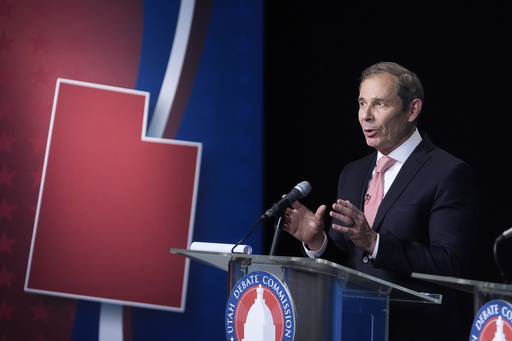In Ogden, Utah, both Republican and Democratic candidates competing for Mitt Romney’s vacant U.S. Senate seat took to the debate stage on Thursday, aiming to persuade voters about their respective plans for addressing climate change and safeguarding the state’s abundant natural resources.
Republican U.S. Representative John Curtis, who chairs the Conservative Climate Caucus, was challenged by climate activist and mountaineer Caroline Gleich. Gleich sought to undermine Curtis’ claims of being a proactive congressman on climate matters. “I’ve heard from young people who feel immense anxiety regarding the future of our planet,” Gleich stated. She emphasized her environmental advocacy and the necessity to move beyond traditional political figures, asserting that simply recycling the same politicians won’t resolve the ongoing climate crisis. At 38, she represents a significant challenge in a state that has not seen a Democratic senator since 1970, as Utahans generally lean towards moderate Republicans like Curtis and Romney.
The race’s winner in November will replace Romney, a significant centrist voice in Washington and a critic of former President Donald Trump. Romney recently reaffirmed that he will not support Trump in the upcoming election, though he has opted not to align himself with prominent Republicans, such as former U.S. Representative Liz Cheney, who have endorsed Democratic Vice President Kamala Harris. Romney expressed his desire to remain influential in a Republican Party that he believes requires reconstruction following this election cycle.
At 64, Curtis has drawn comparisons to Romney because of his readiness to challenge those in his party who propagate the idea that climate change is a myth. In the primary elections held in June, Curtis outperformed a candidate backed by Trump in a competitive field. Although he initially promised to support the eventual Republican nominee, he has refrained from making substantial endorsements of Trump.
In a state known for its outdoor activities and appreciation of clean air and water, both candidates regard environmental issues as pivotal, albeit with differing strategies. Curtis stands as the longest-serving member of Utah’s House delegation, dedicating his time in Congress to bringing a conservative perspective to what has traditionally been a Democrat-led topic. He advocates for a Republican-centered climate policy that intends to cut emissions while maintaining American jobs and economic integrity.
On Thursday, Curtis elaborated his market-oriented strategy concerning Utah’s water challenges. With the Great Salt Lake dwindling due to climate change and water being diverted for human consumption—mainly for agriculture—the resulting exposed lakebed releases harmful minerals that degrade air quality and public health. Curtis voiced his commitment to uphold Utah’s agricultural sector while encouraging leaders to adopt minor adjustments as part of a larger solution.
“The synergy of the private sector, a non-adversarial approach to agriculture, combined with Utah’s innovative spirit, will allow us to address this issue while fostering growth and prosperity,” Curtis articulated.
Contrastingly, Gleich asserted that she intends to expedite water conservation initiatives across the West and persuade lawmakers to recognize the region’s water resources as limited. Curtis garnered support in the primary from several leading environmental organizations, although they typically favor Democratic candidates. Meanwhile, Gleich has secured backing from the League of Conservation Voters Action Fund and Protect Our Winters, an environmental organization with which she previously collaborated to influence policymakers, including Curtis.
Nevertheless, the congressman has enjoyed significant backing from the state’s coal, oil, and gas sectors, urging legislative leaders not to dismiss the fossil fuel industry—a vital economic sector in his congressional area—as part of a feasible clean energy future. He maintains that the U.S. can meet its emission-reduction targets while continuing to utilize certain fossil fuels, especially natural gas, which contributes less carbon dioxide compared to other fossil fuel sources during combustion.
Gleich has criticized Curtis for catering to the fossil fuel sector and voting against eco-friendly initiatives proposed by Democrats, including the Inflation Reduction Act. If she triumphs in the election, she promises to support the cessation of federal subsidies for fossil fuels and to advocate for investments in electric vehicle infrastructure.


